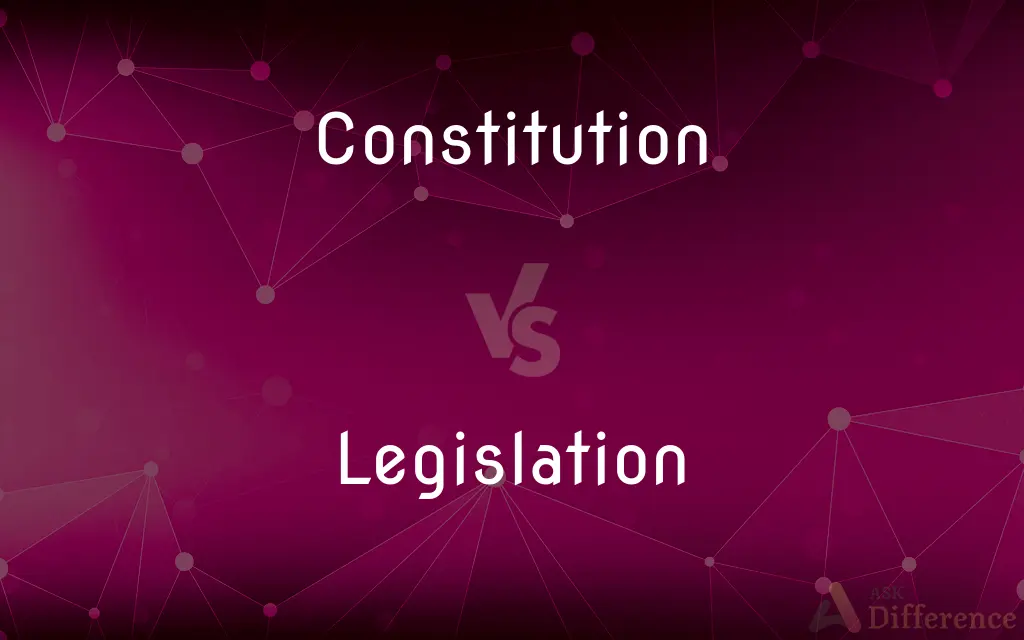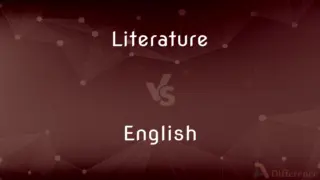Constitution vs. Legislation — What's the Difference?
By Tayyaba Rehman & Maham Liaqat — Updated on March 10, 2024
The Constitution sets the fundamental principles of governance, while legislation consists of laws passed within these principles.

Difference Between Constitution and Legislation
Table of Contents
ADVERTISEMENT
Key Differences
The Constitution is the supreme law that outlines the structure, powers, and duties of a government, establishing the framework within which a state or country is governed. It sets the foundational principles and rights that protect the citizens' freedoms. Legislation, on the other hand, refers to laws created by a legislative body within the framework of the Constitution. These laws are specific rules and regulations that govern daily activities and are subject to change through the legislative process.
While the Constitution is designed to be a stable and enduring document, requiring a complex process for amendments, legislation is more flexible, allowing for relatively easier modifications or repeals to adapt to new situations and societal needs. This flexibility in legislation ensures that the legal system remains relevant over time.
The Constitution often includes a bill of rights or a declaration of fundamental rights, ensuring the protection of citizens' liberties such as freedom of speech, religion, and assembly. Legislation, whereas, focuses on the specifics of how these rights are implemented and regulated in everyday situations, providing detailed guidelines and procedures.
Legislation is enacted through a formal legislative process, which can vary from country to country but generally involves proposal, debate, and approval by a legislative body. The Constitution, on the other hand, is established through a more foundational process, often involving special conventions or a supermajority in the legislative body, reflecting its supreme status.
In terms of enforcement, the Constitution provides the ultimate legal authority, and any legislation inconsistent with it can be deemed unconstitutional and void. This highlights the Constitution's role in setting the legal boundaries within which legislation must operate.
ADVERTISEMENT
Comparison Chart
Nature
Fundamental principles and framework of governance
Specific laws and regulations within the constitutional framework
Stability
Generally stable and difficult to amend
More flexible and subject to frequent changes
Focus
Outlines rights, duties, and the structure of government
Details regulations and guidelines for implementing rights and policies
Creation Process
Established through foundational processes, often requiring a supermajority
Enacted by legislative bodies through a formal legislative process
Enforcement
Supreme legal authority; can invalidate conflicting legislation
Must comply with the constitutional framework; can be amended or repealed
Compare with Definitions
Constitution
The Constitution establishes the basic structure and principles of a government.
The U.S. Constitution sets the framework for federal governance and the separation of powers.
Legislation
Legislation can be reviewed by the judiciary to ensure it aligns with the Constitution.
The Supreme Court can strike down laws that violate constitutional principles.
Constitution
Changing the Constitution requires a rigorous process, often involving supermajorities.
The U.S. Constitution has been amended only 27 times since 1789.
Legislation
Legislation refers to the laws and statutes enacted by a governing body.
The Civil Rights Act of 1964 is landmark legislation in U.S. history.
Constitution
It often includes a section dedicated to protecting citizens' fundamental rights.
The First Amendment of the U.S. Constitution guarantees freedoms concerning religion, expression, assembly, and the right to petition.
Legislation
Legislation can be relatively easily amended or repealed to address new challenges.
New environmental laws are frequently introduced as our understanding of climate change evolves.
Constitution
The Constitution is the highest law of the land, and all other laws must conform to it.
Laws deemed unconstitutional by the Supreme Court are nullified.
Legislation
Provides detailed regulations for implementing constitutional principles.
Legislation sets specific guidelines for voting rights, as outlined broadly in the Constitution.
Constitution
It sets the boundaries and guidelines within which legislation must be created.
The Constitution provides the basis for the creation and scope of laws by Congress.
Legislation
Laws are created through a defined legislative process, involving debate and approval.
A bill must pass both houses of Congress and be signed by the President to become law in the U.S.
Constitution
A constitution is an aggregate of fundamental principles or established precedents that constitute the legal basis of a polity, organisation or other type of entity and commonly determine how that entity is to be governed.When these principles are written down into a single document or set of legal documents, those documents may be said to embody a written constitution; if they are encompassed in a single comprehensive document, it is said to embody a codified constitution. The Constitution of the United Kingdom is a notable example of an uncodified constitution; it is instead written in numerous fundamental Acts of a legislature, court cases or treaties.Constitutions concern different levels of organizations, from sovereign countries to companies and unincorporated associations.
Legislation
Legislation is law which has been promulgated (or "enacted") by a legislature or other governing body or the process of making it. Before an item of legislation becomes law it may be known as a bill, and may be broadly referred to as "legislation", while it remains under consideration to distinguish it from other business.
Constitution
The act or process of composing, setting up, or establishing.
Legislation
Laws, considered collectively
Housing legislation
Constitution
The composition or structure of something; makeup.
Legislation
The act or process of legislating; lawmaking.
Constitution
The physical makeup of a person
Having a strong constitution, she had no trouble climbing the mountain.
Legislation
A proposed or enacted law or group of laws.
Constitution
The system of fundamental laws and principles that prescribes the nature, functions, and limits of a government or another institution.
Legislation
The act of legislating; preparation and enactment of laws.
Pass legislation
There is a lack of legislation about human cloning.
Constitution
The document in which such a system is recorded.
Legislation
Law which has been enacted by legislature or other governing body
Constitution
Constitution The supreme law of the United States, consisting of the document ratified by the original thirteen states (1787-1790) and subsequent amendments.
Legislation
The act of legislating; preparation and enactment of laws; the laws enacted.
Pythagoras joined legislation to his philosophy.
Constitution
The act, or process of setting something up, or establishing something; the composition or structure of such a thing; its makeup.
Legislation
Law enacted by a legislative body
Constitution
(government) The formal or informal system of primary principles and laws that regulates a government or other institutions.
Legislation
The act of making or enacting laws
Constitution
(law) A legal document describing such a formal system.
Constitution
(Catholicism) A document issued by a religious authority serving to promulgate some particular church laws or doctrines.
Constitution
A person's physical makeup or temperament, especially in respect of robustness.
He has a strong constitution, so he should make a quick recovery from the illness.
Constitution
(dated) The general health of a person.
Constitution
The act or process of constituting; the action of enacting, establishing, or appointing; enactment; establishment; formation.
Constitution
The state of being; that form of being, or structure and connection of parts, which constitutes and characterizes a system or body; natural condition; structure; texture; conformation.
The physical constitution of the sun.
Constitution
The aggregate of all one's inherited physical qualities; the aggregate of the vital powers of an individual, with reference to ability to endure hardship, resist disease, etc.; as, a robust constitution.
Our constitutions have never been enfeebled by the vices or luxuries of the old world.
Constitution
The aggregate of mental qualities; temperament.
He defended himself with . . . less passion than was expected from his constitution.
Constitution
The fundamental, organic law or principles of government of men, embodied in written documents, or implied in the institutions and usages of the country or society; also, a written instrument embodying such organic law, and laying down fundamental rules and principles for the conduct of affairs.
Our constitution had begun to exist in times when statesmen were not much accustomed to frame exact definitions.
Constitution
An authoritative ordinance, regulation or enactment; especially, one made by a Roman emperor, or one affecting ecclesiastical doctrine or discipline; as, the constitutions of Justinian.
The positive constitutions of our own churches.
A constitution of Valentinian addressed to Olybrius, then prefect of Rome, for the regulation of the conduct of advocates.
Constitution
Law determining the fundamental political principles of a government
Constitution
The act of forming something;
The constitution of a PTA group last year
It was the establishment of his reputation
He still remembers the organization of the club
Constitution
The way in which someone or something is composed
Constitution
United States 44-gun frigate that was one of the first three naval ships built by the United States; it won brilliant victories over British frigates during the War of 1812 and is without doubt the most famous ship in the history of the United States Navy; it has been rebuilt and is anchored in the Charlestown Navy Yard in Boston
Common Curiosities
What does legislation refer to?
Legislation refers to the specific laws and statutes that are enacted by a legislative body within the framework set by the Constitution.
What is a Constitution?
A Constitution is the foundational legal document that outlines the principles, structures, and powers of a government, ensuring the protection of citizens' rights and freedoms.
Can legislation override the Constitution?
No, legislation cannot override the Constitution. Laws deemed unconstitutional can be invalidated by the judiciary.
Can legislation be changed easily?
Yes, compared to the Constitution, legislation can be more easily amended or repealed to adapt to new circumstances and societal needs.
Why is the Constitution difficult to amend?
The Constitution is designed to provide a stable framework for governance, requiring a rigorous process for amendments to ensure changes reflect broad consensus and serious consideration.
What is a bill of rights?
A bill of rights is a section of a Constitution that lists and guarantees fundamental rights and freedoms to the citizens.
How are constitutional rights implemented?
Constitutional rights are implemented through specific legislation that provides detailed guidelines and procedures.
Are all countries governed by a Constitution?
Most countries have a Constitution or a similar foundational legal document, but the nature and role of these documents can vary widely.
How are laws created under legislation?
Laws are created through a legislative process, which typically involves proposal, debate, and approval by a legislative body.
How does the Constitution differ from legislation?
The Constitution serves as the supreme law setting the fundamental principles of governance, while legislation consists of specific laws that operate within those principles.
What happens if a law conflicts with the Constitution?
If a law conflicts with the Constitution, it can be challenged in court and potentially be declared unconstitutional and void.
What role does the judiciary play in relation to the Constitution and legislation?
The judiciary interprets the Constitution and reviews legislation to ensure laws comply with constitutional principles.
How does a new law become part of legislation?
A new law becomes part of legislation after it is proposed, debated, and approved by the legislative body, and, in many systems, signed by the head of state.
How does the Constitution influence daily governance?
The Constitution influences daily governance by providing the legal and ethical framework within which all governmental actions and legislation must operate.
What is judicial review?
Judicial review is the process by which courts evaluate laws and governmental actions to ensure they are in compliance with the Constitution.
Share Your Discovery

Previous Comparison
Didicoy vs. Pikey
Next Comparison
Literature vs. EnglishAuthor Spotlight
Written by
Tayyaba RehmanTayyaba Rehman is a distinguished writer, currently serving as a primary contributor to askdifference.com. As a researcher in semantics and etymology, Tayyaba's passion for the complexity of languages and their distinctions has found a perfect home on the platform. Tayyaba delves into the intricacies of language, distinguishing between commonly confused words and phrases, thereby providing clarity for readers worldwide.
Co-written by
Maham Liaqat













































